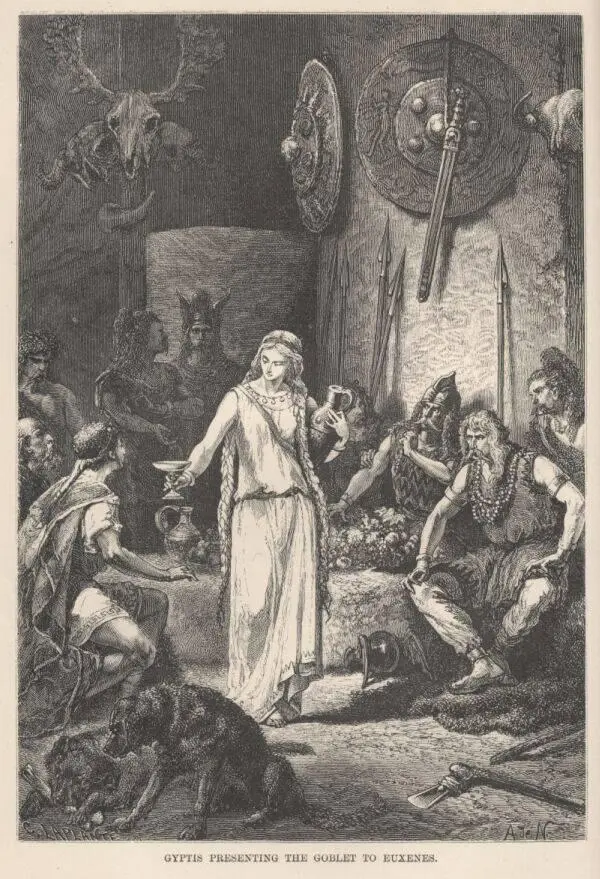Of even such towns there were scarcely any as yet, save in the most populous and least uncultivated portion of Gaul; that is to say, in the southern and eastern regions, at the foot of the mountains of Auvergne and the Cevennes, and along the coasts of the Mediterranean. In the north and the west were paltry hamlets, as transferable almost as the people themselves; and on some islet amidst the morasses, or in some hidden recess of the forest, were huge intrenchments formed of the trees that were felled, where the population, at the first sound of the war-cry, ran to shelter themselves with their flocks and all their movables. And the war-cry was often heard: men living grossly and idly are very prone to quarrel and fight. Gaul, moreover, was not occupied by one and the same nation, with the same traditions and the same chiefs. Tribes very different in origin, habits, and date of settlement, were continually disputing the territory. In the south were Iberians or Aquitanians, Phoenicians and Greeks; in the north and north-west, Kymrians or Belgians; everywhere else, Gauls or Celts, the most numerous settlers, who had the honor of giving their name to the country. Who were the first to come, then? and what was the date of the first settlement? Nobody knows. Of the Greeks alone does history mark with any precision the arrival in southern Gaul. The Phoenicians preceded them by several centuries; but it is impossible to fix any exact time. The information is equally vague about the period when the Kymrians invaded the north of Gaul. As for the Gauls and the Iberians, there is not a word about their first entrance into the country, for they are discovered there already at the first appearance of the country itself in the domain of history.
The Iberians, whom Roman writers call Aquitanians, dwelt at the foot of the Pyrenees, in the territory comprised between the mountains, the Garonne, and the ocean. They belonged to the race which, under the same appellation, had peopled Spain; but by what route they came into Gaul is a problem which we cannot solve. It is much the same in tracing the origin of every nation, for in those barbarous times men lived and died without leaving any enduring memorial of their deeds and their destinies; no monuments; no writings; just a few oral traditions, perhaps, which are speedily lost or altered. It is in proportion as they become enlightened and civilized, that men feel the desire and discover the means of extending their memorial far beyond their own lifetime. That is the beginning of history, the offspring of noble and useful sentiments, which cause the mind to dwell upon the future, and to yearn for long continuance; sentiments which testify to the superiority of man over all other creatures living upon our earth, which foreshadow the immortality of the soul, and which are warrant for the progress of the human race by preserving for the generations to come what has been done and learned by the generations that disappear.
By whatever route and at whatever epoch the Iberians came into the south-west of Gaul, they abide there still in the department of the Lower Pyrenees, under the name of Basques; a people distinct from all its neighbors in features, costume, and especially language, which resembles none of the present languages of Europe, contains many words which are to be found in the names of rivers, mountains, and towns of olden Spain, and which presents a considerable analogy to the idioms, ancient and modern, of certain peoples of northern Africa. The Phoenicians did not leave, as the Iberians did, in the south of France distinct and well-authenticated descendants. They had begun about 1100 B.C. to trade there. They went thither in search of furs, and gold and silver, which were got either from the sand of certain rivers, as for instance the Allege (in Latin Aurigera), or from certain mines of the Alps, the Cevennes, and the Pyrenees; they brought in exchange stuffs dyed with purple, necklaces and rings of glass, and, above all, arms and wine; a trade like that which is nowadays carried on by the civilized peoples of Europe with the savage tribes of Africa and America. For the purpose of extending and securing their commercial expeditions, the Phoenicians founded colonies in several parts of Gaul, and to them is attributed the earliest origin of Nemausus (Nimes), and of Alesia, near Semur. But, at the end of three or four centuries, these colonies fell into decay; the trade of the Phoenicians was withdrawn from Gaul, and the only important sign it preserved of their residence was a road which, starting from the eastern Pyrenees, skirted the Gallic portion of the Mediterranean, crossed the Alps by the pass of Tenda, and so united Spain, Gaul, and Italy. After the withdrawal of the Phoenicians this road was kept up and repaired, at first by the Greeks of Marseilles, and subsequently by the Romans.
As merchants and colonists, the Greeks were, in Gaul, the successors of the Phoenicians, and Marseilles was one of their first and most considerable colonies. At the time of the Phoenicians’ decay in Gaul, a Greek people, the Rhodians, had pushed their commercial enterprises to a great distance, and, in the words of the ancient historians, held the empire of the sea. Their ancestors had, in former times, succeeded the Phoenicians in the island of Rhodes, and they likewise succeeded them in the south of Gaul, and founded, at the mouth of the Rhone, a colony called Rhodanusia or Rhoda, with the same name as that which they had already founded on the north-east coast of Spain, and which is nowadays the town of Rosas, in Catalonia. But the importance of the Rhodians on the southern coast of Gaul was short-lived. It had already sunk very low in the year 600 B.C., when Euxenes, a Greek trader, coming from Phocea, an Ionian town of Asia Minor, to seek his fortune, landed from a bay eastward of the Rhone. The Segobrigians, a tribe of the Gallic race, were in occupation of the neighboring country. Nann, their chief, gave the strangers kindly welcome, and took them home with him to a great feast which he was giving for his daughter’s marriage, who was called Gyptis, according to some, and Petta, according to other historians. A custom which exists still in several cantons of the Basque country, and even at the centre of France in Morvan, a mountainous district of the department of the Nievre, would that the maiden should appear only at the end of the banquet, and holding in her hand a filled wine-cup, and that the guest to whom she should present it should become the husband of her choice. By accident, or quite another cause, say the ancient legends, Gyptis stopped opposite Euxenes, and handed him the cup. Great was the surprise, and, probably, anger amongst the Gauls who were present. But Nann, believing he recognized a commandment from his gods, accepted the Phocean as his son-in-law, and gave him as dowry the bay where he had landed, with some cantons of the territory around. Euxenes, in gratitude, gave his wife the Greek name of Aristoxena (that is, “the best of hostesses”), sent away his ship to Phocea for colonists, and, whilst waiting for them, laid in the centre of the bay, on a peninsula hollowed out harbor-wise, towards the south, the foundations of a town, which he called Massilia—thence Marseilles.

Scarcely a year had elapsed when Euxenes’ ship arrived from Phocea, and with it several galleys, bringing colonists full of hope, and laden with provisions, utensils, arms, seeds, vine-cuttings, and olive-cuttings, and, moreover, a statue of Diana, which the colonists had gone to fetch from the celebrated temple of that goddess at Ephesus, and which her priestess, Aristarche, accompanied to its new country.
Читать дальше













